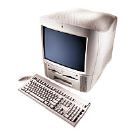- 2002.10.10
Apple may or may not recover the lost market share it once had in
education. I think that might be a function of the disgust with
Redmond's blackmail tactics for site licensing more than anything Apple
itself does. One of the reasons I think this is true is that Apple
doesn't go after the real education market; it goes after the glitz
education market.
The glitz market is your Maine iBook contracts, your digital movie
studios, your websites linked to Antarctic research stations with
streaming media that has to be used in the library because that's where
the T1 line is. Stuff that shows up on Apple's Hot News. Stuff that the
pundits write about on Cnet or eWeek.
It looks good. It smells good. For those kids who get access to it,
it might even be good.
But for millions upon millions more, the only exposure to the real
function of computers - as tools to get the job done - is through that
lone teacher or small school that "gets it" and by hook or by crook
hammers together a lab full of computers or a cart full of iBooks or
solicits donations in such numbers and with such low standards that for
every usable computer you get you have three junkers in the back. For
folks like these, it is not a question of migration to OS X. It's
a question of migration to OS 9. Or even 8. Or, God help us,
7.
When you're struggling with a hodgepodge of equipment, upgrades are
driven by the slowest ship in the fleet. It's the Lowest Common
Denominator, baby, not the highest. If you're like myself, your
district is firmly planted in OS 9, and X is just an experiment.
And there's that one piece of software that just doesn't work right, so
OS 9 is where it's at.
Now Apple has announced that computers sold in 2003 will not be able
to boot into OS 9. Not long after, I venture to say, Apple will
remove the Classic layer from OS X altogether, leaving mixed
networks still theoretically functional, but at the cost of purchasing
brand new software for the X side. I'd say, given the pace of recent
events, you'll be hearing that shoe drop sometime in '05 or maybe
'06.
Then the folks who crib together these makeshift networks will have
to look elsewhere for technical information, specifications, product
reviews, and so on, Apple is already positioning OS X software as
easier to find on the "Made 4 Mac" pages, and there will come a day
when OS 9 software is declared end of life and removed from the
list altogether.
Just as today you can find more information about System 6
on hobbyist sites than on the Apple site, someday in the not too
distant future you'll be able to say the same thing about
OS 9.
Don't get me wrong. My school is well-equipped. It is still stuck in
OS 9, but that'll eventually change. But for every school like
mine, I know there are a dozen still struggling to make that LC surf the Net, trying to get a little
more mileage out of that crappy 5200, trying to make that Performa
recognize its ethernet card. And none of these machines will ever be
asked to run OS X. Ever.
Am I a Luddite, refusing to upgrade or consider the new features
that OS X has to offer? No. I've installed OS X three times
now, and the more I use it, the more I like it.
What I am is a realist. I have three 500 MHz iMacs that I have to
surrender to new teachers in our overcrowded school.  Beyond
that, I'll have some 300 MHz Blue and White Towers, some
AIO Macs at 233 MHz,
and then it goes downhill until the old 7200/90s I have near the
window.
Beyond
that, I'll have some 300 MHz Blue and White Towers, some
AIO Macs at 233 MHz,
and then it goes downhill until the old 7200/90s I have near the
window.
I would like to go all OS X, but I can't - and it's not entirely my
fault, either, is it?
I think somebody from Apple education needs to go visit a school
that isn't already thoroughly imbued with newer Macs. Somebody high up,
if you catch my drift.
It's a good thing there are websites like Low
End Mac to help you through these times, because Apple sure isn't
making the effort. Because of all those smaller schools and underfunded
labs that keep things running until money comes along to buy new Apple
hardware, you'd think Apple would be just a touch more appreciative of
the little websites that support its current users and future
customers.
is a longtime Mac user. He was using digital sensors on Apple II computers in the 1980's and has networked computers in his classroom since before the internet existed. In 2006 he was selected at the California Computer Using Educator's teacher of the year. His students have used NASA space probes and regularly participate in piloting new materials for NASA. He is the author of two books and numerous articles and scientific papers. He currently teaches astronomy and physics in California, where he lives with his twin sons, Jony and Ben.< And there's still a Mac G3 in his classroom which finds occasional use.

 Beyond
that, I'll have some 300 MHz
Beyond
that, I'll have some 300 MHz 
